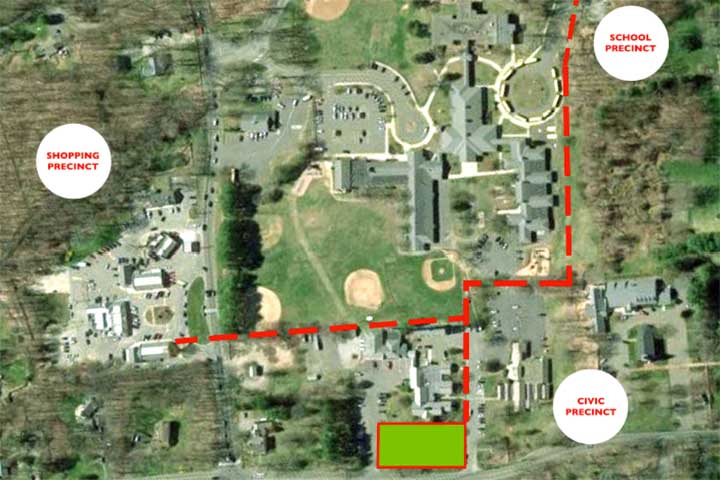Town Green Meeting Continues, Wednesday

This evening, the Historic District Commission continues its meeting about the proposed Town Green. While the public comment portion of the proceedings has concluded, tonight's meeting is still very much a public session. It takes place at 8:00 in the Town Hall Meeting Room.
Architect Nancy Thiel was pleased with the turnout for the hearing on August 7.
"The whole idea of the town green," she said, "is to bring the community together. It’s great to see how much support it has. I am truly grateful."
There were a few unpleasant moments at that meeting, but for the most part it was highly informative, as Ms. Thiel answered questions about the design and residents offered suggestions.
Only one thing remained unclear for many participants: the role and responsibilities of the Historic District Commission.
The HDC's Role
Connecticut municipalities are not required to have historic districts, but if they do, they must have at least one historic district commission. Weston's one commission covers five districts, including Historic District No. 1, usually referred to as the Norfield District, which includes the Town Hall campus, where the Town Green would be located.
The HDC's duties, limitations, and legal authority are spelled out in State law. In general, the commission is responsible for preserving and protecting historically and architecturally significant resources in historic districts. The State is exempt from HDC review, but except for matters pertaining to street improvements, towns are not.
For new buildings to be constructed in an historic district, or existing ones demolished, or alterations made to the exteriors of buildings, an application must be submitted to the HDC for a Certificate of Appropriateness, assuming the building is visible from "a public way."
The commission has no say about anything interior, or about the color of paint, or about vegetation. But it does have authority over exterior "fixed structures," which include windows, doors, shutters, signs, some parking areas, fences, walls, driveways, walkways, exterior lighting, and extremely heavy objects, such as sculptures, that are functionally "fixed" by virtue of gravity and weight.
The Certificate of Appropriateness
The HDC cannot deny an application simply because they do not like it, would prefer it be somewhere else, or for any other arbitrary reason. Nothing about the statute implies that historic properties are meant to be encased in amber. The statute does not require the use of historical techniques or materials, and does not require adherence to a particular architectural period or style.
So long as members determine that whatever is to be built is "not incongruous" with the character of the historic district — essentially meaning it would not be wildly out of place — they must issue a certificate.
If a commission denies an application, it must provide a detailed explanation of why, and the specific criteria that were applied. Commissions are free, even encouraged, to recommend improvements to the application. Both of these things have happened already with the Town Green plan. In May, the commission objected to the design of benches, which in the plan would be fixed to the ground, and lamp posts. Members made suggestions for revisions to the plan, and Ms. Thiel made them. Her new application is the one currently being reviewed.
